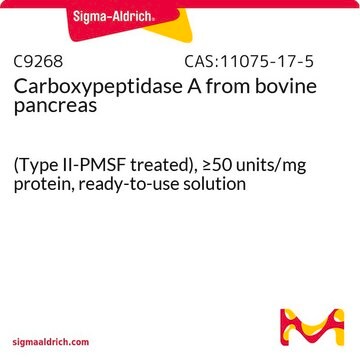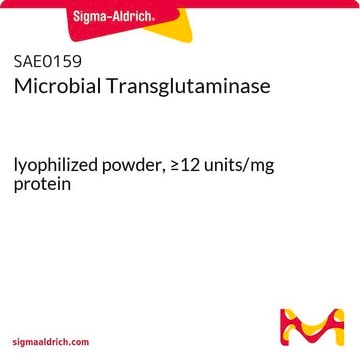E1411
Proline Specific Endopeptidase from Flavobacterium sp.
lyophilized powder, ≥5.0 units/mg solid
Synonym(s):
EndoProC, Endoprolylpeptidase, Endoproteinase Pro-C, PEPase, Prolyl Endopeptidase
Sign Into View Organizational & Contract Pricing
All Photos(1)
About This Item
UNSPSC Code:
12352204
NACRES:
NA.54
Recommended Products
Application
Proline specific endopeptidase is useful for the determination of amino acid sequences of peptides and proteins containing proline residues. Proline specific endopeptidases may be useful in cancer, neurology and diabetes research . Prolyl endopeptidase (PEP) may be used as a drug target for neuropsychiatric diseases such as stress disorder, depression, and schizophrenia .
Biochem/physiol Actions
An endopeptidase is a proteolytic peptidase that breaks peptide bonds of nonterminal amino acids. Product E1411 is specific for proline (Pro). The Prolyl endopeptidase (PEP) mechanism is thought to be an induced fit mechanism, where the native enzyme exists in a conformationally flexible opened state but is changed to a closed state upon substrate binding .
Unit Definition
One unit causes the formation of one micromole of p-nitroaniline per minute under specific pH and temperature conditions.
Physical form
White amorphous lyophilized powder
Storage Class Code
11 - Combustible Solids
WGK
WGK 3
Flash Point(F)
Not applicable
Flash Point(C)
Not applicable
Certificates of Analysis (COA)
Search for Certificates of Analysis (COA) by entering the products Lot/Batch Number. Lot and Batch Numbers can be found on a product’s label following the words ‘Lot’ or ‘Batch’.
Already Own This Product?
Find documentation for the products that you have recently purchased in the Document Library.
Customers Also Viewed
Min Li et al.
The Journal of biological chemistry, 285(28), 21487-21495 (2010-05-07)
Prolyl peptidases cleave proteins at proline residues and are of importance for cancer, neurological function, and type II diabetes. Prolyl endopeptidase (PEP) cleaves neuropeptides and is a drug target for neuropsychiatric diseases such as post-traumatic stress disorder, depression, and schizophrenia.
Our team of scientists has experience in all areas of research including Life Science, Material Science, Chemical Synthesis, Chromatography, Analytical and many others.
Contact Technical Service









